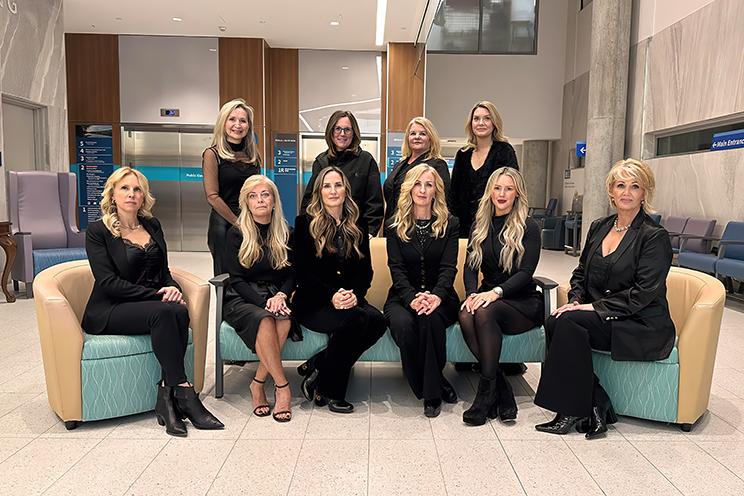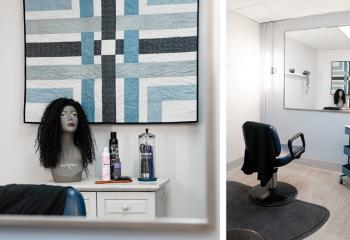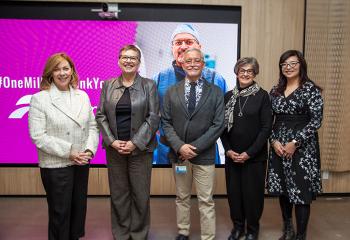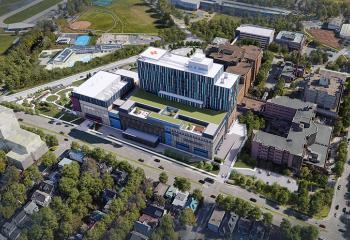
This year, with a goal of raising $1 million, the Orchid Women’s Health Initiative is partnering with the QEII Foundation to help fund a second robotic surgical system for women’s oncology at the QEII Health Sciences Centre. CONTRIBUTED
Orchid Women's Health Initiative (The Orchid Gala) helping improve lives
Sheri Morgan and Liz Rigney were heartbroken when they lost their best friend, Deanne Reeve, to cervical cancer in 2020.
Determined to honour Deanne’s memory and further advance women’s health care in the region, the dynamic duo joined forces in 2023 to form the Orchid Women’s Health Initiative (The Orchid Gala). This effort is a way of improving women’s health care by focusing on providing the latest technology and equipment and improving women’s health facilities with new infrastructure, leading to less invasive treatments, more efficient care, shorter wait times, and better tools for doctors.
Sheri, Liz and their dedicated committee of passionate and like-minded women are focused on improving early detection, effective treatment, and comprehensive prevention of pelvic floor disorders and cancers affecting gynecologic organs (vulva, vagina, cervix, uterus, ovaries and fallopian tubes), the bladder and rectum.
Thanks to the generous support of sponsors, donors and the community, The Orchid Gala has raised more than $1.2 million to directly fund new infrastructure, technology and equipment at the Dartmouth General Hospital and IWK Health. In 2023, they delivered $500,000 for infrastructure to create the Deanne Reeve Pelvic Health Suite at Dartmouth General Hospital, which officially opened on Feb. 25, 2025.
In 2024, they provided $730,000 for much-needed new technology and equipment for the IWK’s gynecology department. An additional $30,000, The Deanne Reeve Silver Lining, was delivered to the United Way support charity, Supportive Housing for Young Mothers.
This year, they’re partnering with the QEII Foundation to help fund a second robotic surgical system — the leading-edge da Vinci Xi — for gynecologic oncology at the QEII Health Sciences Centre. Their goal is to raise $1 million and according to Liz, failure is not an option.
“Hopefully, we’ll hit that target and then some. We seem to be jumping in leaps and bounds every year,” Liz enthusiastically shares.
“We focus on infrastructure and new technology and equipment, which in turn will help the government to attract and retain the specialists we need in this province for women’s health.”
In 2019, the QEII Foundation introduced Atlantic Canada’s first surgical robot technology to the QEII. Since then, this cutting-edge system has helped perform more than 1,600 cancer surgeries at the QEII, including more than 250 for gynecological cancers and conditions.
“We’re trying to shorten wait times with better outcomes for women and help the government bring in new physicians and nurses. It’s certainly a draw when you have access to amazing technology, like the new da Vinci Xi robot,” says Sheri.
“The QEII Foundation is amazing and we’re absolutely thrilled to be working with them on this project.”
Although Deanne shied away from being the centre of attention, Liz is certain Deanne would be thrilled that her friends are standing up for her and all the women of Nova Scotia through the initiative.
“We’ve had such great support. People stepped up and believed in what we were doing right away. So many people cared for and respected Deanne — I’m sure she’d be delighted and proud that we’re making a difference in her name,” adds Liz, who is equally grateful to the QEII Foundation for its level of commitment to the project.
Dr. Stephanie Scott, gynecologic oncologist and the QEII’s division head for gynecologic oncology, was the first surgeon to perform robotic surgery for gynecological cancer in Atlantic Canada. She says robotics has truly been a game-changer by offering a minimally invasive surgery for a patient population that would have otherwise not been able to have it.
“It has made the difference between a three- or four-night hospital stay with a lengthy recovery to now one night in hospital and often even same-day surgery. Minimally invasive surgery reduces the risk of infection, bleeding and other surgical complications. It’s been fantastic for our patients,” Dr. Scott points out.
On average, she says about two gynecological robotic surgeries are being performed at the QEII each week because they currently only have access to the robot one day a week. Having a second robot will provide patients with more access in a timelier manner and save women’s lives by giving them access to care for their gynecological cancers.
“The women of Nova Scotia deserve the best,’’ says Dr. Scott, who is excited to utilize this new robotics technology for even more gynecologic oncology procedures, alongside fellow robotic surgeons, Dr. Karla Willows and Dr. Lana Šačiragić.
“Most of the women undergoing robotic surgery have curable cancers, so giving them minimally invasive surgery will allow them to get on with their life faster with fewer complications and less pain. Right now, we don’t always have the access that we need, so it’s important to make sure it’s equitable for all the people who need it.”
For more information on The Orchid Gala, visit TheOrchidGala.com.


